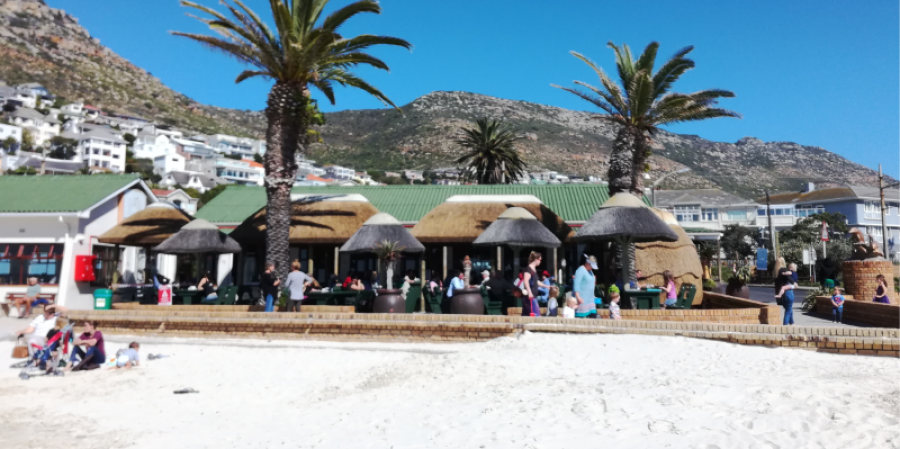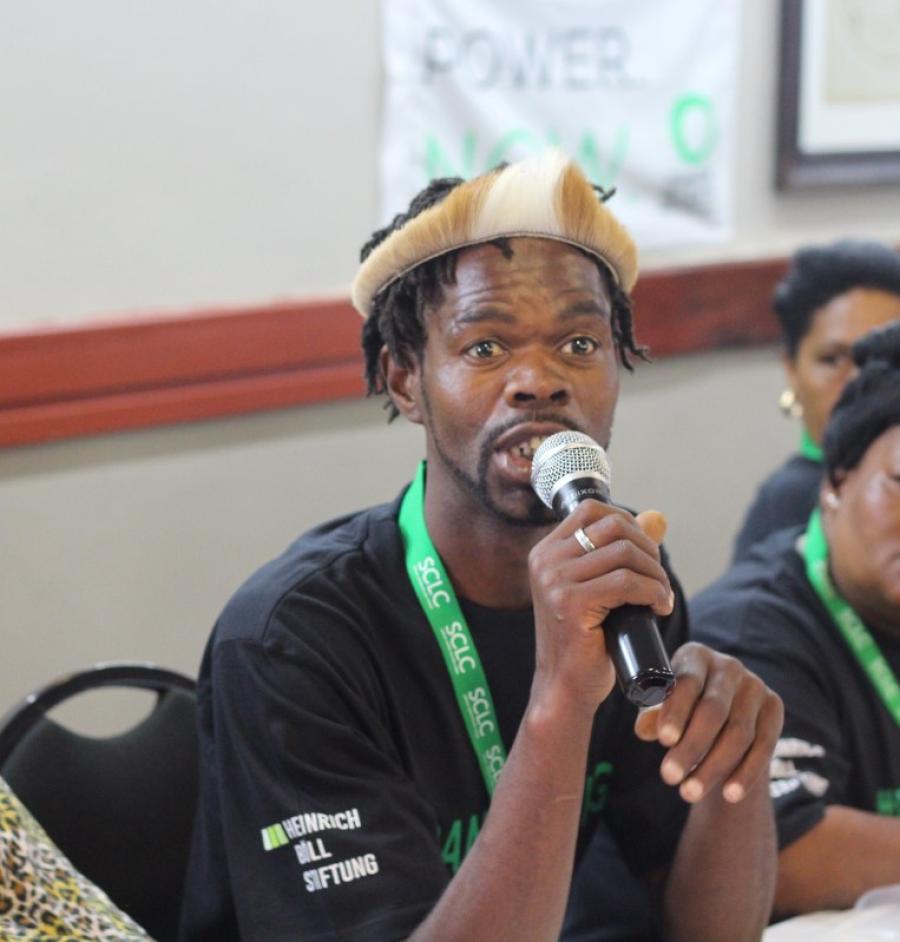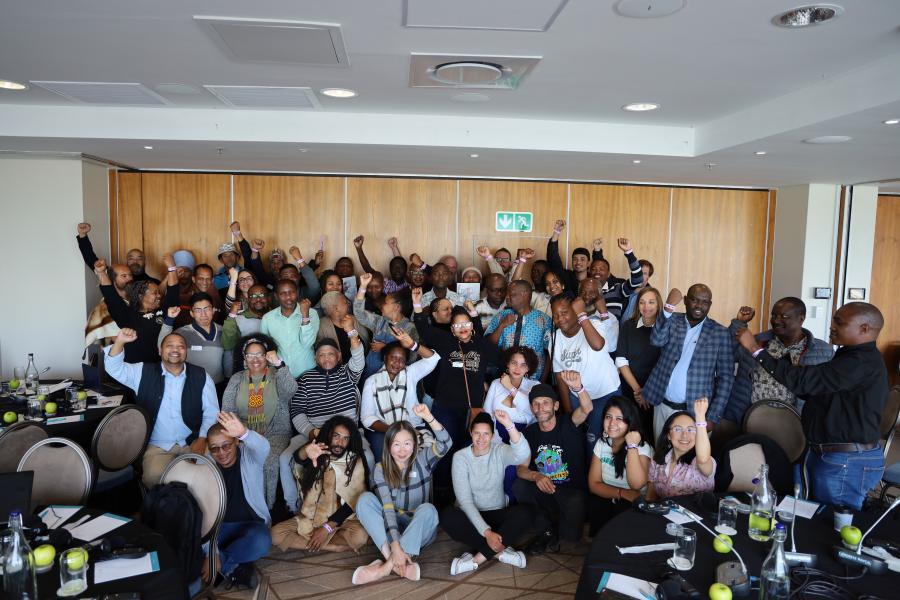Very much a product of the last decade, warlords have become a critical feature of the escalating violence in Natal, particularly in the KwaZulu homeland areas of the region, and other parts of South Africa. These warlords and their vigilantes, rising out of political manipulation, political unrest, and grinding poverty, have both a political and material interest in disrupting any peace initiative because they feed off - and survive on - violence. Peace would deny them their livelihood: providing protection, arms procurement, weapons smuggling, killing for heir, and bodyguard duty.
Much of the violence in Natal is organized and launched from the rural areas and informal squatter settlements. Moreover, in the ongoing struggle for hegemony between the Inkatha Freedom Party and the African National Congress (ANC), warlords have been accused of busing armed supporters to areas of conflict, fueling the cycle of violence. Warlords, too, are the targets of violence that often emanates from their areas of control.
The region's social and political climate, and in particular the conditions in the spontaneous informal settlements that encircle the municipal area of Durban and the rural slums around Pietermaritzburg, is closely tied toe warlordism. This climate has been major factor in the growth of the warlords' power. The lack of formal control, or of any other alternative structures in the informal settlements, has enabled warlords to establish a firm presence in these areas. In addition, the political unrest in Natal since the mid-1980s has provided warlords with fertile ground in which to escalate their activities, often with apparent immunity from prosecution.
"Warlord" is term applied by their critics. In Natal, a warlord has de facto power in a local area and owes only nominal allegiance to any higher authority. There are several different types of warlords - based on hereditary status and on participation in paramilitary activities ranging from rural "traditional" indunao (headmen - induna in singular form) to hired-guns/enforcers to squatter-lords.
STYLES OF WARLORDING
The rural/semirural traditional induna is a legacy of "indirect rule,' apartheid style, in which all recognized hereditary chiefs had a traditional tax base. Anybody visiting a chief was expected to offer honorary gifts. For example, gaining permission to build a house required a certain payment. In many rural areas controlled by Inkatha today, the rates are lower for Inkatha members.
Fees are also extracted through schools. Thus, when a regional school inspector leaves an area, every school must contribute to his "farewell gift." This system of buying privileges stems from an effort to make the administration of black Africans pay for itself by allowing the chiefs to rule over their own tribespeople.
One rural warlord has introduced a number of new "customs" into his community, including a five-rand (about $1.75) Inkatha membership fee if any non-Inkatha community member wants to slaughter a cow. Anyone who refuses to pay is fined 150 rand by the chief of the larger area. An Inkatha member who wants to slaughter to the warlord. In another new "customs," if an Inkatha member marries, the wedding must be reported to the warlord, who will assign an Inkatha observer or guard to attend - for a small fee. (Warlord supporters frequently disrupt non-Inkatha weddings).
Another warlord type is the urban/town councilor, who uses his position - as town councilor or chair of the local Inkatha branch or even as a member of the KwaZulu Legislative Assembly - to monopolize a township's structures of power and privilege. Such warlords, usually Inkatha supporters, rely heavily on a partronage system based on their controlling the rights to grant housing sites, issues trading licenses, and secure spaces in KwaZulu schools, among things. Although these rights legally rest with the town council, many town councilor wardlords usurp them as personal privileges.
The hired-gun or enforcer warlord develops a power base through fear and intimidation. His services can be used for either intimidating or assassinating political opponents. Although nominally independent, the hired-gun relies on the partronage of local warlords. In broad terms, this Mafia-style warlord exploits and profits from the business of killing.
The squatter-lord operates in the squatter areas around Durban. The mushrooming settlements around Durban have created a need for order, especially because chiefs are usually far away and a local man acquires effective power as an induna. The popularity of this local strongman depends on this ability to organize vigilantes to curb crime. To pay his vigilantes, he creates a tax base from rents or a household levy. This type of warlord, primarily a crime-prevention vigilante, can also use his vigilantes against outsiders.
Eventually squatter-lords require protection themselves - from rivals and from KwaZulu government interference - and typically opt for formally joining Inkatha. In Kwa Zulu, this relationship is based upon a quid pro quo: as a reward for being left, alone and being allowed to follow their own devices, the warlords deliver supporters for Inkatha rallies and "soldiers for any fighting. Sometimes they bus vigilantes to other warlords who might need assistance or organize vigilante attacks on United Democratic Front (UDC)/ANC strongholds.
Nothing directly equivalent to a warlord exists in the UDF/ANC structures, although the so-called "comrades" (amaqabaneo) also tax locals. Their slogan is, "If you want us to defend you, you must pay us so that we can buy bullets." Certain areas trying to avoid government corruption have joined the ANC; rule by the comrades is perceived to be less expensive and more democratic. However, criminals, called comtsotsis, sometimes exploit the anti-apartheid struggle. While professing to be comrades, they loot and extort for personal gain. Occasionally, inter-comrade fights occur in ANC areas. In Edendale during February 1991, genuine comrades armed themselves and wiped out the local comstotsis, who had been exploiting the unrest for their won ends and had used terror to take over parts of the township.
Economics, too, can stimulate breakaways. Young comrades independlty try to raise funds for recreational facilities by extorting a levy from inhabitants. In some ANC-controlled areas, ANC leaders have set up organizations similar to those run by warlords. Also on the left are civic associations, some of which have become as authoritatrian as any Inkatha warlord. Ostensibly democratic, these associations have been known to resort to intimidation to get their way in the communities under their control.
"LEGAL" SQUATTERS AND THE EMERGENCE OF WARLORDS
By setting on land in a KwaZulu area, and African is not considered a squatter. Legally, person only needs the permission and and land allocation from the local induna to build. Such a situation spawns warlords: no formal freehold title exists in the "tribal" areas, and local chiefs or warlords exploit their control of tribal or communal land by renting it to rural migrants.
Lack of formal land titles often means rule by the strongest. Warlords or chiefs ensure their control first by setting up a tax base and then using the income to hire vigilantes - ostensibly to prevent crime but often to attack nearby areas, burning shacks down to force residents out.
The potential for large-scale violence was inherent in the structure of the squatter settlements. During the 1980s, much of the emphasis in the urbanization around Durban centered on control of land or the political infrastructure by which access to land was determined. Tensions between those with access to resources and those without periodically erupted in conflict.
There was an administrative vacuum as well, because town councils in KwaZulu had little power and no money to enforce their authority. The conflict was not only for scarce land but for jobs. Moreover, warlordism created tensions within communities and between informal settlements and formal townships. According to a 1990 article in the Durban Sunday Tribune, the squatter areas formed "a complex of powerful fiefdoms whose chief characteristics are a medieval code of power and patronage quite insensible to the reach of law."
Prior to the establishment of the KwaZulu homeland, the central government had controlled the appointment of a chief (khosi), even though his claim was based on his heredity. However, the government had on occasion bypassed legal claimants in favor of more compliant nominees. When KwaZulu became self-governing in 1975, the right to appoint chiefs passed to the Inkatha-controlled government. Frequently, appointments rewarded Inkatha supporters.
Chiefs, in turn, appoint indunas to control wards. Under native law, chiefs in the tribal areas control the allocation of land as well as the tribal court - that is, they can levy fines and pass judgment in certain cases involving the people under their control.
In addition, by law, a chief can have six tribal policemen to serve largely as bodyguards and enforces. In the past, these police had old shotguns. However, since 1990 the KwaZulu government has supplied them with G3 automatic rifles, which are often carried around in public. Increasingly, the warlord-type chiefs make use of the tribal police for retaliatory attacks and other vigilante actions, such as intimidating political opponents. In the townships, town councilors are licensed to carry pistols "for their own protection." In addition, many Inkatha officials use KwaZulu police as bodyguards. In most cases, these police bodyguards are special constables (kitskonstables) with only six weeks of training. They have sometimes been used to attack activists in the townships.
In the informal settlements, squatterlords maintain control with traditional tribal hierarchies similar to tribal police. Some of these urban warlords have appointed indunas who control wards that are divided into neighborhood block committees. In turn, these committees have chairmen who are de facto impi (regiment) captains; they control the young men in the neighborhood block, who resemble the impi warriors (amabutho). These youths are organized to patrol or, when needed, to participate in attacks. They also check whether residents have paid their monthly rents or possess Inkatha membership cards.
The similarity to tribal police can be extended. Some urban warlords also hold their own "private" courts and, as in rural areas, control the allocation of house sites.
ELIMINATING WARLORDISM
Unfortunately, no easy solutions present themselves. Warlordism is intricately connected to both political and socio-economic conditions in Natal. As a start, the authorities could recognize the warlords' existence and make an effort to neutralize their various power bases. Media exposure could also help to undercut warlords' positions.
One obvious solution would be to change the land-tenure systems in the KwaZulu homeland, a variety of systems that includes occupational rights, deed of grant, 99-year leaseholds, and even freedholds. At the least, control of land allocation should be taken away from one individual (the chief) and vested in a communal council whereby some standard formal property right accrues to the occupier.
Furthermore, land tenure should not be so tenuous that warlords can push residents out and then squat illegally, without fear of eviction. Too often, authorities simply recognize the rights of those who physically possess the land. Such a situation encourages local warlords to forcibly increase the size of the land under their direct control.
Local authorities should also recognize existing squatter communities. Establishing town boards or local authorities might restrict warlords' power and recognizing the existence of an informal settlement might immediately undercut the warlords' tax base. If residents could pay their rents and levies for services (water, lights, and refuse removal) directly to a town council, the warlord would lose his economic extortion base and hence his ability to fund vigilantes. With their coercive powers diluted, warlords would find it difficult to enforce payment of Inkatha membership dues.
The failure to declare more formal townships had directly contributed to the growth in the warlords' power. It is also why so many warlords' power. It is also why so many warlords resist the attempts of developers to upgrade squatter areas. In addition, proper roads and drainage would make it easier for the authorities to exert official control over the areas.
Obviously the police need to step up their efforts to prosecute warlords. Too often warlords have been aided in their efforts to elude justice by shoddy investigations, poor preparation of cases, and the disappearance of witnesses. Given the excessive intimidation of court witness, and official witness protection program - none exists now - is a priority. Furthermore, warlords and their private armies should be disarmed.
Rural areas suffer because the system of tribal administration lends itself to abuses. The system should be more democratic and the chiefs and headmen more accountable to their people. At present, a great deal of uncertainty and confusion exist over the role chiefs should play in any future political system. Rural areas are burdened with a tribal police force that exists outside a formal security structure and basically serves as a private army for tribal chiefs. Obviously chiefs can't be left unprotected, but they can't act as if they are above the law. A place will have to be found in the structures of government for tribal authorities.
The prevailing climate of political intolerance has created openings for a criminal element. What might have been started for political motives has, in the context of the economic recession and high unemployment rates, spiraled into criminal violence. Unfortunately, warlordism appears to be strongly entrenched in many of Natal's black communities. It will take a great deal of effort - from all sides - to eliminate it.
Article copyright Cultural Survival, Inc.



